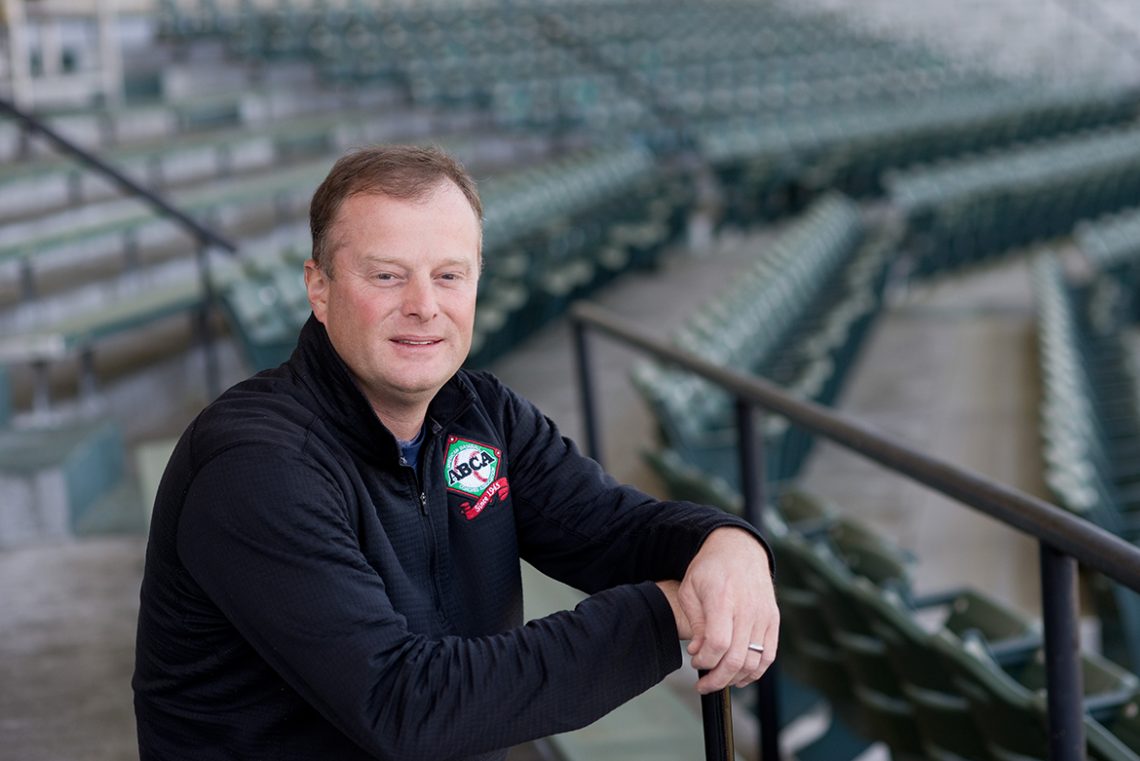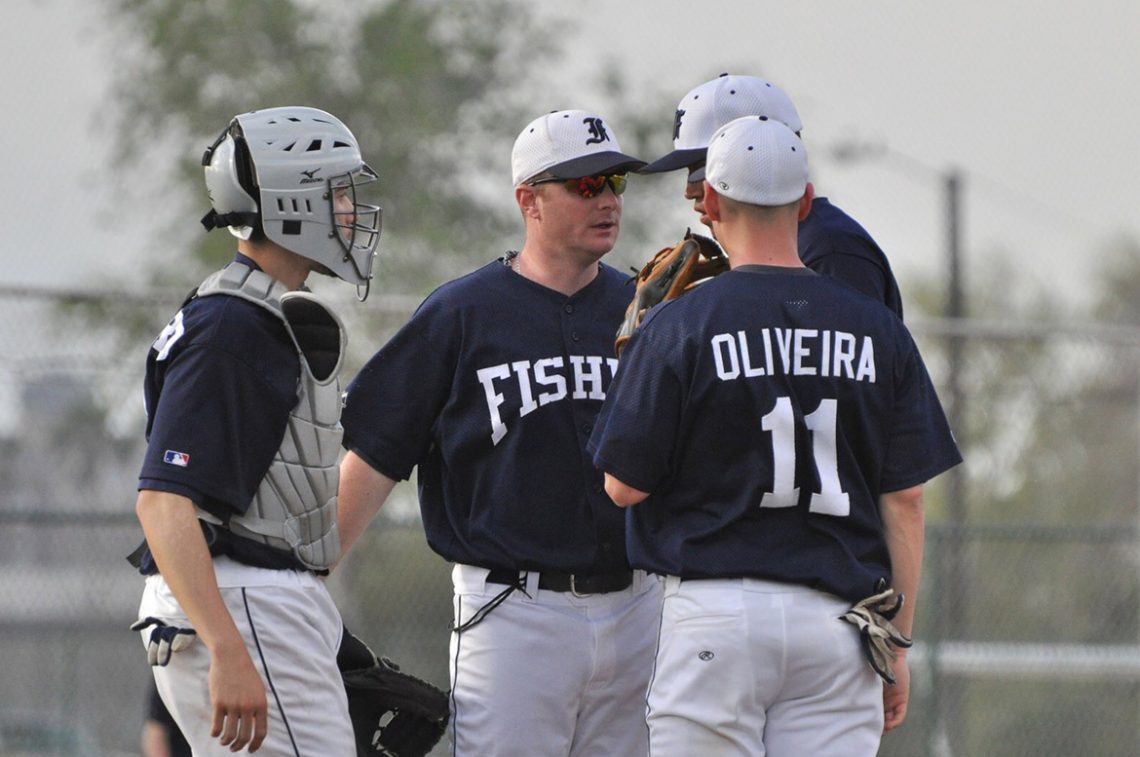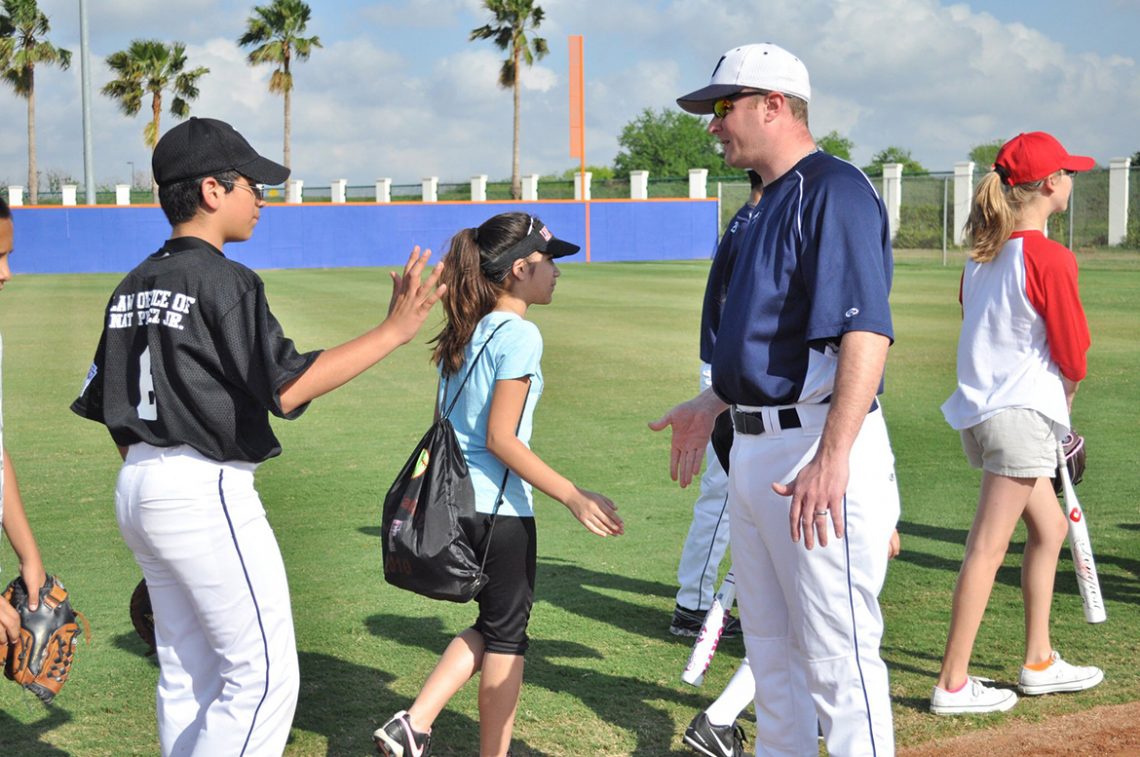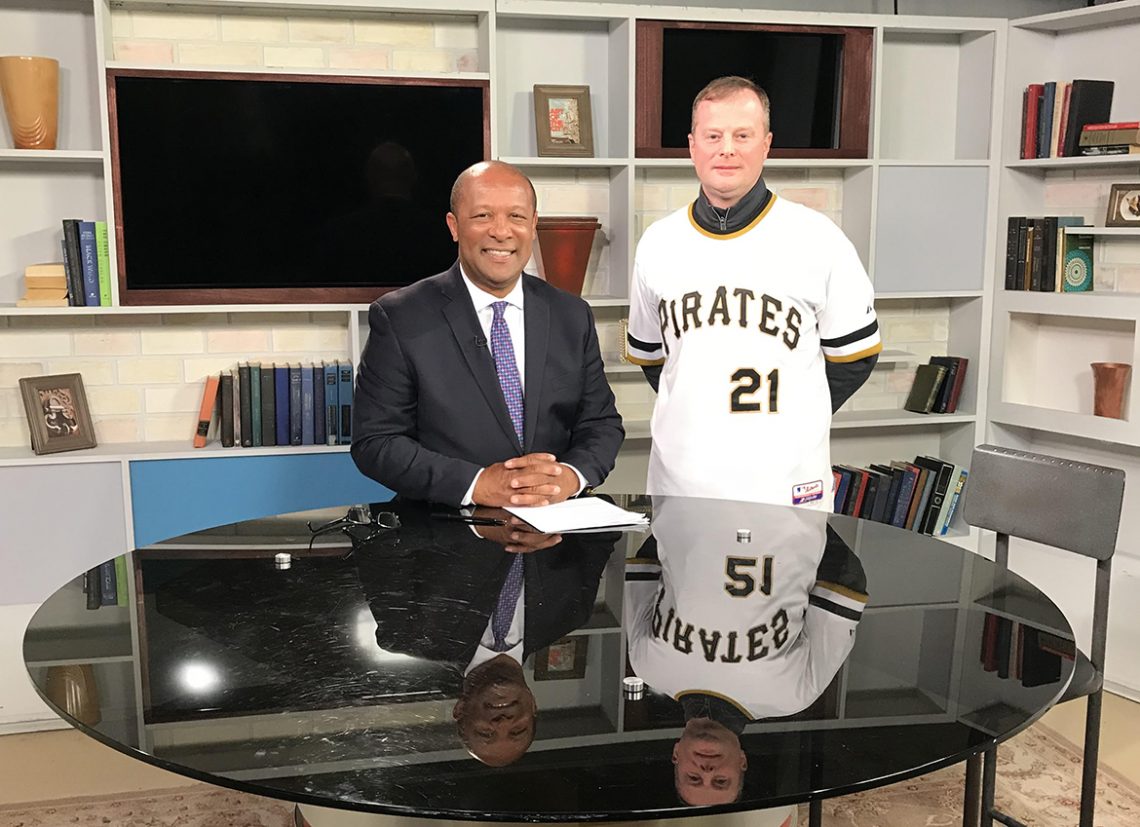Whether it’s through serving Fisher College as director of athletics or his work on the Board of the Roberto Clemente Foundation, Scott Dulin ’98 has made baseball and athletics forces for good at home and abroad.
By Michael Angelides ’12, May 2019
At the tender age of 25, Scott Dulin ’98 built the Fisher College Department of Athletics from scratch while skippering the college’s NAIA baseball team. Eighteen seasons on, he has notched over 500 wins for the Falcons, led the program to seven conferences championships and four regional titles, and strengthened alumni giving to Fisher Athletics through his work as the college’s athletics advancement officer.

Dulin ’98 says the first baseball card he owned as a kid was of Roberto Clemente. “So there is a sentimental piece to my Board work on a personal level, but the satisfaction is also there because of how much Clemente did for the Latino community and for the world at large.” (Photo by Renée DeKona.)
Along the way, Dulin has been named conference Coach of the Year five consecutive seasons, coached the Falcons to postseason play every year since 2003, and — through his recruiting for Fisher Baseball in Puerto Rico — was invited to help guide the humanitarian work of the Roberto Clemente Foundation as a member of its Board of Directors.
“I’m a baseball guy, and I’ve been that way since I was 4,” says Dulin. “I remember the first baseball card I ever got when I was a kid was a Roberto Clemente card, and when I first got to Fisher, our first community service efforts involved working with the Roberto Clemente Youth Program here in Boston. So there is a sentimental piece to my Board work on a personal level, but the satisfaction is also there because of how much Clemente did for the Latino community and for the world at large.”
In this installment of the Q&A series “Ask Me Another,” Dulin explains his journey from teaching special education students in Mexico, Maine, to helping the Clemente Family realize their vision for improving the lives of children everywhere.
Let’s start with Fisher College. How did you come to be there and what was your first position at Fisher?
“When I first came back down to the Boston area after graduating from Farmington, I was the assistant athletic director and head baseball coach at Massachusetts College of Pharmacy. Mass College of Pharmacy and Fisher College had an academic consortium that evolved into an athletic consortium, meaning we got players from both schools on one team, within one athletic department. After two years of the athletic consortium, the president of Fisher College had seen enough and said, ‘Let’s start our own.’ So I was asked to basically start up the athletics program here from scratch as the director of athletics and head baseball coach.
You were just 25 when you got the director of athletics position at Fisher. How did you end up in that role at such a young age?
“After graduating from UMF, I was teaching Special Education up in Mexico, Maine, and working as Coach Dick Meader’s assistant coach. I was 23 at the time and one of my job duties was to help with some non-conference scheduling, so I was calling Mass College of Pharmacy about some games, and they told me their head baseball coach position was open. The younger brother of one of my former teammates from UMF, Gary Marden ’97, was playing on that team and they’d heard about me through Gary.”

In 18 seasons as the only head coach of Fisher College baseball, Dulin ’98 has notched over 500 wins for the Falcons and led the program to seven conferences championships and four regional titles. (Photo courtesy of Fisher College Athletics.)
It seems as though building an athletics program from scratch would be a tall order for anybody really, but especially for someone in their mid-20s as you’re just starting out in your career. How did you manage it?
“Throughout my years at Farmington I did a lot of work study for the Athletics Department, so I got to see a lot of the ins and outs of it. Len MacPhee was the director of athletics at the time, so I got to see what he did. Coach Meader and I worked well together; he kind of opened my eyes to pretty much how everything runs. And then for two years I was an assistant athletic director [at Mass College of Pharmacy], I got to really see how a small private school runs. A lot of it was trial and error. They hired me on July 1 to have the athletics program running by September 1. Literally, I walked in, we had no office, I had no phone, and we didn’t even know what we were going to call ourselves. I used all my old NAIA connections with UMaine Farmington and Thomas and those guys, and we ended up affiliated with NAIA all in a short period of time. Really it was just a lot of hours. I never understood exactly what Coach Meader meant when he would tell me, ‘If you really want to get into this industry, you have to understand you’re going to have to give up your personal time, and you’ll probably gain a lot of new friends from a professional side, but you’re going to lose a lot of friends because of the time it takes. You just don’t have the time to do the things you’d normally do.’ And he was 100 percent right; it’s a lot of time and effort and, again, a lot of trial and error.”
What taught you the most in that journey?
“Fisher is a small college, and financially we’re 94 percent tuition dependent. At the time I didn’t even know what that means, or how important recruiting is with an enrollment-driven institution. I was worrying about the logistics — the problems associated with the fact that we didn’t have facilities: Where are we going to play? How are we going to get players there? What will our uniforms be? What kind of uniform deals can I find in this short time frame? But I wasn’t paying attention to the larger picture, like why we started the athletics program in the first place to boost our four-year student enrollment and our male student enrollment. Two years prior to starting the independent athletics department, we went from an all-female, two-year school to a four-year co-ed school. At the time I had no idea how large a role athletics was meant to play in that transition. After a couple of years, I really started to see that recruiting has a real impact on the institution and we need to do a better job of focusing on recruitment and retention.”
How has your role at Fisher evolved since you were first hired 18 years ago?
“Well, I was in the same role for 15 years: the dual role of baseball coach and athletic director, and now I am working on the development side, so I’m head of athletics development and head baseball coach.”
Is there an advantage, professionally, to being a head coach and directly responsible for athletics fundraising?
“Well, it’s opened up a lot of other avenues and possibilities. Being director of athletics was all about running a program and making sure all the coaches are doing what they need to do and paying attention to some of the analytics like retention rates and graduation rates and overall team GPAs, and where needs are. The development side requires looking at the operation from a larger scale, regarding how can athletics really help the institution. It also opened my eyes to the people I was meeting. As director of athletics, I wasn’t looking at people as potential donors or potential partners. Once you put on the development hat that changes. A good example, which I’m sure we’ll talk about, is the Roberto Clemente Foundation. Had I not been in the development role when I met them, I would still be talking to them about baseball and baseball recruitment and so on. But from a development point of view, the conversation becomes, ‘They are doing some very good things, and this is a great opportunity for collaboration with our college as a whole.’”

In his role on the Board of Directors for the Roberto Clemente Foundation, Dulin ’98 helps develop and implement programming that mixes athletics with efforts to improve children’s health, well-being, and educational success. (Photo courtesy of Scott Dulin ’98.)
What’s the Foundation’s primary focus and its geographic reach?
“The Roberto Clemente Foundation became an official foundation just over a year ago. Prior to that we were operating as a foundation but without the nonprofit status, and we were putting together a team, our board, as we went. The Foundation is based out of Puerto Rico, we have board members from all over who have accomplished much in their careers; we have CEOs, we have the vice president for Major League Baseball, we have college coaches, we have a U.S. Marine Hall of Famer, and we have the Clemente family members. Our main purpose is to basically maintain and enhance the legacy left behind by Roberto Clemente. As you know, he was one of the best baseball players of all time, but what’s lesser known is that Major League Baseball named an award after him for his humanitarian efforts. We work from an educational standpoint, we help with schooling; we’re helping baseball and its outreach to countries that might not have a growing baseball program. Puerto Ricans are still suffering from Hurricane Maria, and on a weekly basis someone from our foundation is delivering food to people in the mountains, or going to schools and delivering school supplies. It’s an ongoing effort, and now that we’ve become the official Roberto Clemente Foundation, now we’re going to start publicizing more and leveraging social media in the powerful way it can be used. We really want to make sure that we’re utilizing all the resources and all different partners we have from the Smithsonian Museum to contacts with the Department of Education at the highest levels. The idea is to make a difference using that same legacy that Roberto left behind.”
Where do your personal responsibilities fall within the foundation’s larger programmatic goals?
“We are a working board but we’re all doing this as volunteers and we’re trying to keep it that way. I serve on the educational side; I’m helping develop some ideas on how to implement baseball activities with education. For example Roberto Clemente Baseball Academy in Haiti was started with a group of doctors that do work down there. In Haiti, many children don’t get the proper medical treatments or annual physicals that we’re used to in the States. The Foundation has mandated that to be part of the baseball academy. You have to go and get your annual checkups and in order to do that you have to be legal and documented which is also uncommon for many children born in Haiti. Ultimately, this all becomes a part of the process for enrolling students. Instead of just providing the Academy itself to students, we are ensuring that they become legally documented and have access to medical infrastructure they wouldn’t otherwise have access to. My role in this is trying to include schooling in the process, as regular, formal schooling can be uncommon in the area. Basically, if you’re part of the baseball program, you have to be part of the school system and enrolled which means you need the medical paperwork, which requires the legal documentation, and we help these children to accomplish every step of that process.”
It seems as though the mission expanded as the Board came to see the community up close and saw where there was additional need within those communities.
“Absolutely. As I’ve worked with the Foundation I have learned more and more about who Roberto Clemente was as a person, as a man, and what his goals were. He wanted to make sure that every child had an opportunity to do what they love to do and to get an education. And that was his top priority, above and beyond whatever happened with baseball and baseball clinics and so on. The goal was opportunity through education. When he passed away, Mrs. Clemente continued his dream and started what’s called Sport’s City. For years and years, it was a place to dance, a place to listen to music and to play all sports, but it also provided tutoring. It was a place that helped provide education. For the Clemente family, education is something that’s always been at the forefront.”

As a member of the board of directors, Dulin ’98 works closely with Roberto Clemente’s son Luis to help guide the humanitarian work of the Foundation. (Photo courtesy of Scott Dulin ’98.)
How have you connected your work with Fisher to your work with the Foundation?
“A lot of what you do in development is meet people and figure out if there are ways to collaborate. One of my roles within the foundation was to start figuring out how to facilitate collaboration with institutions of higher education. As Fisher is a member institution of the National Association of Intercollegiate Athletics, one of our core values is service leadership and really getting involved in the community. There’s huge potential for synergy when almost every major city in the country has a Roberto Clemente school or a Roberto Clemente league, or youth sports program. We realized that we needed a pilot program to prove the concept so we placed two of my players working with the local Roberto Clemente youth sport program in a mentorship role and a coaching role. It wasn’t just about coaching the game; it was about the importance of being educated and doing what you need to do to go to college, and how to navigate that process.”
Can you give an example of this synergy?
“Fisher and the Foundation teamed up to host the Roberto Clemente cup here in Boston, in March, and incorporated Major League Baseball, the Red Sox, the Red Sox Foundation, the U.S. Marines, and Toys for Tots. Essentially, we used a Major League Baseball Play Ball event to kick off the entire tournament. This included having a toy drive and an equipment drive for used baseball equipment that will be sent to our Clemente kids in different parts of the world. We’re able to use partnerships to help us grow this brand, but it’s more to grow this way of life — giving back and contributing to the communities that need us.”
I would imagine that you have your hands full with being a collegiate head coach and being responsible for athletics fundraising. What motivates you to do the Board work for the Clemente Foundation, especially since you’re doing it on a volunteer basis?
“Roberto Clemente did so much for the Latino community and for the world at large. There are more Roberto Clemente schools and parks around the world than memorials for any U.S. president. Liberia had his face on their currency. That’s how far reaching his influence was and still is. So, while it’s time consuming, it’s definitely fulfilling. My last trip was to the Pedro Ponce de León School for the Deaf and when I walked in I immediately saw what these people were doing and whom they’re doing it for. The majority of those students would also fall under special needs category because of their communication issues. It immediately brought me back to my days when I’d just finished in Farmington and I was in Mexico, Maine, as a special education teacher, working with students with autism. I said to myself, ‘You know, this is perfect.’ So within a week, I started a campaign to collect the items that they needed to be more successful. Yes, it’s time consuming, but it’s sending a good message to my own family. We consider the Clementes as family, so as time consuming as it is, it really is something we, as a family, believe in. My daughter and I were out on Thanksgiving morning at a store to pick up some odds and ends we needed to cook dinner. We saw a homeless person right by the store and my 6-year-old daughter says, ‘We should go get that person something, because it’s Thanksgiving.’ That’s what we do with the foundation, and if my 6-year-old is already seeing it and understanding it, then it’s paying off.”

